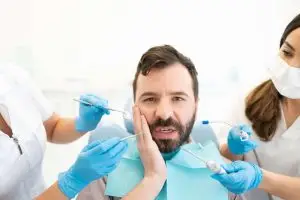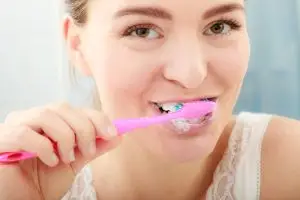Crowns are caps that go on teeth to cover damage or other flaws. Fillings are material placed inside teeth that have been damaged due to cavities or decay. Crowns and fillings can fall out over time, but is this considered a dental emergency? Find out if you should be looking for an emergency dentist in Mesa when you lose a filling or crown.
Causes of Lost Crowns and Fillings
 You can lose dental crowns or fillings for different reasons. In some cases, advanced tooth decay can cause crowns to fall off or fillings to fall out. Injuries to your mouth could also result in knocking a cap or filling loose. If you eat certain types of foods, such as sticky or hard foods, biting down or chewing these can cause you to lose a filling or crown. If you have a habit of chewing on items, such as ice or other objects, or if you grind your teeth, you can also end up with a lost filling or crown.
You can lose dental crowns or fillings for different reasons. In some cases, advanced tooth decay can cause crowns to fall off or fillings to fall out. Injuries to your mouth could also result in knocking a cap or filling loose. If you eat certain types of foods, such as sticky or hard foods, biting down or chewing these can cause you to lose a filling or crown. If you have a habit of chewing on items, such as ice or other objects, or if you grind your teeth, you can also end up with a lost filling or crown.
Dental Emergency vs. Non-Emergency
When you lose a crown or filling, should you seek emergency dental care? In many cases, this doesn’t require an emergency trip to the dentist. While you might experience some discomfort after losing a crown or filling, especially when biting or chewing, you should be able to wait until normal office hours to see a dentist.
When is a lost crown or filling an emergency? You should seek emergency dental care if you lose a crown or filling and experience any signs of infection, since bacteria from these infections can spread to other areas of your body. This can lead to life-threatening symptoms if the infection is left untreated. Signs of a tooth infection include the following:
- Severe pain, especially pain that does not respond to pain relievers
- Swelling in the affected part of your jaw or face
- Fever
- Trouble opening your mouth or moving your jaw
Before Your Appointment
 While waiting for your dental appointment, there are certain things you can do to protect your tooth and help lower your risk of needing a crown or filler replacement. Keep the following in mind prior to your appointment.
While waiting for your dental appointment, there are certain things you can do to protect your tooth and help lower your risk of needing a crown or filler replacement. Keep the following in mind prior to your appointment.
Saving a Crown or Filling
When a filling or crown falls out, you might not need to have it replaced. If you save your crown or filling, your dentist should be able to put it back in in place. This means you won’t have to go through having another filling done or having another crown shaped and put on your tooth. When a crown or filling falls out, you should rinse it off carefully, then store it in a safe place. Make sure you bring it to your dental appointment, so that your dentist can try to secure it back in place.
Protecting Your Tooth
When a filling falls out or a crown falls off, your tooth is more vulnerable to bacteria, which can lead to infections. The affected tooth is also at a higher risk of being damaged until you have it treated. While waiting for your appointment, you should avoid eating certain kinds of foods that could damage your tooth or attract a lot of bacteria, such as sticky or sweet foods and hard foods. If possible, chew on the other side of your mouth to avoid placing pressure on the affected tooth. Brush and floss your teeth, including the affected tooth, to prevent food particles from building up.
Temporarily Replacing a Crown or Filling
If you’re worried about your dental crown or filling breaking while you store it, you can try putting it back in place while waiting for an appointment. You should use temporary dental cement, which is available at many drugstores, to do so. Never use any other type of adhesive to attempt to hold a crown or filling in place.
Managing Pain
You might experience pain when you lose a filling or crown. This can happen due to exposed nerves inside the affected tooth. You can use over-the-counter pain medicines to provide you with short-term relief from minor or more severe discomfort.
Conclusion
If you’ve lost a crown or filling and need an emergency dentist in Phoenix, contact us here at Dental Brothers. We can restore or replace your dental crown or filling to keep your tooth protected from infections and damage and help you with any dental emergencies you may face in the future.
